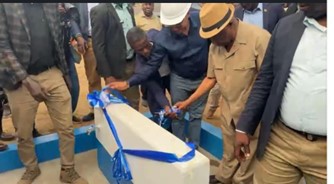President Joseph Nyuma Boakai of Liberia has declared a significant shift in his approach to development initiatives, emphasizing a move away from symbolic gestures towards substantive improvements in infrastructure and living standards for Liberians. His declaration, made during the dedication of a newly renovated market in Paynesville, underscores a commitment to focusing on projects that genuinely uplift communities and reflect the nation’s aspirations nearly two centuries after independence. Central to this shift is President Boakai’s refusal to participate in further dedications of hand pumps, a common practice symbolizing access to water but often failing to address the broader issue of sustainable water infrastructure. He believes that after 178 years of independence, Liberia has outgrown the era of such symbolic gestures and must embrace a more comprehensive approach to development. This new direction prioritizes projects that yield tangible benefits for citizens and contribute to long-term national progress.
President Boakai’s decision to forgo hand pump dedications represents a clear rejection of superficial development efforts. He argues that focusing on symbolic projects undermines the real needs of the Liberian people. Instead, he advocates for investments in robust infrastructure, particularly in the areas of road construction and access to clean water. By prioritizing substantial improvements in these critical areas, he aims to create lasting positive change for communities across the country. This move signifies a broader commitment to moving beyond superficial gestures and tackling the fundamental challenges hindering Liberia’s progress. It represents a strategic realignment of development priorities, emphasizing tangible outcomes over symbolic actions.
Beyond infrastructure development, President Boakai’s vision encompasses a broader focus on empowering Liberian citizens. He emphasizes the importance of creating opportunities for economic advancement, particularly for farmers. His commitment to constructing “farm-to-market” roads demonstrates a practical approach to supporting agricultural development. By improving transportation infrastructure, he aims to facilitate the movement of goods, enabling farmers to access markets and earn a living. This, in turn, contributes to improved livelihoods and empowers families to invest in their children’s education, fostering a cycle of sustainable development.
Central to President Boakai’s philosophy is a commitment to serving the Liberian people and prioritizing their well-being above personal recognition. He explicitly states his desire to avoid having his name attached to public projects, emphasizing that his role is to serve, not to seek praise. This reflects a dedication to genuine public service and a focus on delivering tangible results for the benefit of the nation. He believes that true leadership lies in improving the lives of citizens and building a better future for Liberia, rather than pursuing personal accolades. This principle underscores his commitment to utilizing public resources responsibly and ensuring that development initiatives serve the collective good.
The renovation of the Broad Street Market in Paynesville serves as a practical example of President Boakai’s commitment to meaningful development. The collaborative effort, involving various government entities and private partners, resulted in significant improvements to the market infrastructure. This project demonstrates a tangible investment in supporting local businesses and enhancing economic opportunities for market vendors. It also showcases the potential for collaborative initiatives to drive positive change and improve the lives of ordinary Liberians. By focusing on practical projects that directly benefit communities, President Boakai aims to create a more prosperous and sustainable future for the nation.
President Boakai’s call for collective action underscores his belief that national development is a shared responsibility. He encourages all Liberians to actively participate in building a better future for the country. By urging citizens to appreciate and support positive initiatives, he aims to foster a sense of ownership and shared responsibility for national progress. This emphasis on collective action reflects a belief that sustainable development requires the active participation of all stakeholders. By working together, Liberians can create a more prosperous and equitable future for generations to come. This call for unity and collaboration serves as a foundation for building a stronger and more resilient nation.


